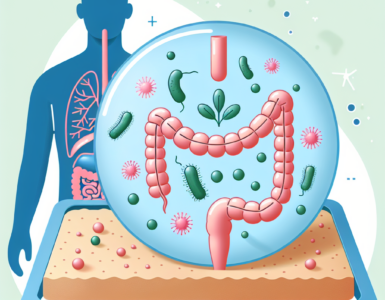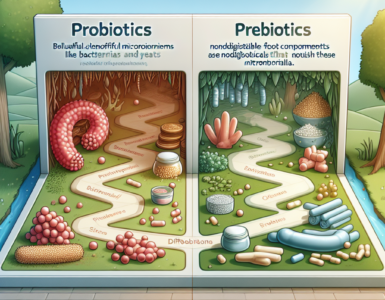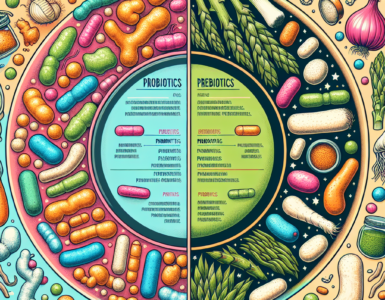Unveiling the Role of Fats in Nutrition
The role of fats in nutrition has been a topic of much debate and misunderstanding. This section aims to clarify the misconceptions and highlight the essential nature of fats in a balanced diet, emphasizing the benefits of healthy fats.
The Misconceptions Surrounding Fats
Fats have often been portrayed as detrimental to health, leading to widespread avoidance among those concerned about weight gain and heart disease. However, this perspective fails to distinguish between different types of fats and their diverse effects on the body.
| Misconception | Fact |
|---|---|
| All fats are equal and negatively impact health. | Different types of fats have varied effects on the body; some are actually beneficial for health. |
| Eating fat leads to weight gain. | Excessive calories lead to weight gain, not fat consumption per se; fats are essential for nutrient absorption and satiety. |
| Low-fat diets are always healthier. | Low-fat diets can lead to deficiencies in fat-soluble vitamins and essential fatty acids. |
The Essential Nature of Fats in the Human Diet
Fats are a vital macronutrient, playing a key role in numerous bodily functions:
- Fats are a major source of energy, supplying 9 calories per gram, which is more than double the energy provided by carbohydrates or proteins.
- They are necessary for the absorption of fat-soluble vitamins (A, D, E, and K) and carotenoids, aiding in a myriad of functions, including vision, blood clotting, and immune system support.
- Fats contribute to the structural integrity of cell membranes, ensuring proper cell function and communication.
- Essential fatty acids obtained from dietary fats are crucial for brain health, inflammatory response regulation, and the development of healthy skin and hair.
Understanding the role of fats in nutrition is foundational to making informed dietary decisions. By recognizing the benefits of healthy fats, individuals can incorporate these nutrients into their diets in a way that supports overall health and well-being.
Types of Dietary Fats
Fats play a multifaceted role in nutrition, serving as energy sources, supporting cell growth, and producing important hormones. Understanding the different types of dietary fats is essential for making informed decisions about what to include in a balanced diet.
Saturated Fats
Saturated fats are typically solid at room temperature and are found in various animal and plant products. They have been traditionally linked to heart disease, although recent studies suggest the connection may not be as straightforward. Saturated fats should be consumed in moderation.
| Sources of Saturated Fats | Typical Percentage of Total Fat |
|---|---|
| Butter | 63% |
| Beef Fat | 50% |
| Coconut Oil | 87% |
Unsaturated Fats
Unsaturated fats are considered the ‘benefits of healthy fats’ due to their positive effects on heart health and cholesterol levels. They are typically liquid at room temperature and can be further categorized into monounsaturated and polyunsaturated fats.
Monounsaturated Fats
Monounsaturated fats are known for their ability to improve cholesterol levels and reduce the risk of heart disease. They are a staple in the Mediterranean diet, which is often held up as a model for healthy eating.
| Sources of Monounsaturated Fats | Typical Percentage of Total Fat |
|---|---|
| Olive Oil | 73% |
| Avocado | 71% |
| Almonds | 65% |
Polyunsaturated Fats
Polyunsaturated fats include essential fatty acids like omega-3 and omega-6, which the body cannot produce on its own. They contribute to brain function, cell growth, and inflammation reduction.
| Sources of Polyunsaturated Fats | Omega-3 (%) | Omega-6 (%) |
|---|---|---|
| Walnuts | 9% | 52% |
| Flaxseeds | 23% | 6% |
| Salmon | 40% | 5% |
Trans Fats
Trans fats are created through hydrogenation, which solidifies liquid oils. They are associated with an increased risk of heart disease and should be avoided as much as possible. Trans fats are often found in processed foods and baked goods.
| Products Commonly Containing Trans Fats | Estimated Trans Fat Content |
|---|---|
| Margarine | Varies |
| Fast Food | Varies |
| Packaged Snacks | Varies |
Understanding the types and sources of dietary fats allows health-conscious individuals to make choices that align with their health and nutrition goals. While all fats have a place in a balanced diet, the emphasis should be on unsaturated fats for their numerous health benefits.
The Health Benefits of Healthy Fats
Fats have long been misunderstood, but recent research has illuminated the critical role they play in overall health. Understanding the benefits of healthy fats is essential for anyone looking to maintain a balanced and nutritious diet.
Supporting Cell Function
Fats are fundamental components of cell membranes, playing a critical role in maintaining cell integrity and facilitating cell communication. They help cells stay flexible and responsive to changes in their environment, which is essential for proper function.
Boosting Brain Health
The human brain is composed of nearly 60% fat, making healthy fats vital for brain health. They contribute to cognitive function, memory, and mood regulation. Omega-3 fatty acids, in particular, have been shown to support brain development and may reduce the risk of cognitive decline.
Enhancing Nutrient Absorption
Certain vitamins, such as A, D, E, and K, are fat-soluble, meaning they require fat for their absorption into the bloodstream. Including healthy fats in one’s diet ensures that these vital nutrients are efficiently absorbed and utilized by the body.
Balancing Hormones
Fats play a key role in the production and regulation of hormones. They are involved in the synthesis of sex hormones and adrenal hormones, which manage stress and metabolic processes. Adequate intake of healthy fats helps maintain hormonal balance and supports overall endocrine health.
Providing Energy
While carbohydrates are the body’s primary energy source, fats serve as a concentrated energy reserve. They provide 9 calories per gram, more than double the amount provided by carbohydrates or proteins. Fats are essential for sustaining energy, particularly during endurance activities or when the body’s carbohydrate stores are depleted.
By understanding the numerous benefits of healthy fats, health-conscious adults can make informed decisions about their dietary fat intake. Emphasizing the inclusion of fats that support bodily functions, mental well-being, nutrient uptake, hormonal equilibrium, and energy levels is a key aspect of a well-rounded nutrition plan.
Sources of Healthy Fats
Identifying the right sources of healthy fats is key for individuals aiming to enhance their diet. Healthy fats are found in a variety of foods, and incorporating a balance of these can contribute to overall well-being.
Plant-Based Sources
Plant-based sources are a vital component of a diet rich in healthy fats. These sources primarily provide monounsaturated and polyunsaturated fats, including omega-3 and omega-6 fatty acids.
| Plant-Based Fat Source | Type of Healthy Fat |
|---|---|
| Avocados | Monounsaturated |
| Nuts (almonds, walnuts, cashews) | Polyunsaturated, Monounsaturated |
| Seeds (flaxseeds, chia seeds) | Polyunsaturated (ALA omega-3) |
| Olive oil | Monounsaturated |
Including these plant-based fats not only contributes to the intake of healthy fats but also provides other essential nutrients such as fiber, vitamins, and minerals.
Animal-Based Sources
Animal-based sources of fats offer a combination of saturated and unsaturated fats, with certain options being rich in omega-3 fatty acids, predominantly found in fish.
| Animal-Based Fat Source | Type of Healthy Fat |
|---|---|
| Fatty fish (salmon, mackerel) | Polyunsaturated (EPA & DHA omega-3) |
| Eggs (especially the yolk) | Monounsaturated, Polyunsaturated |
| Grass-fed meat | Saturated, Monounsaturated |
| Dairy (cheese, butter) | Saturated, Monounsaturated |
Opting for grass-fed and organic animal products can often provide a higher content of certain nutrients, including omega-3 fatty acids.
Omega-3 and Omega-6 Fatty Acids
Omega-3 and omega-6 fatty acids are types of polyunsaturated fats that are essential, meaning the body cannot produce them and they must be obtained through the diet.
| Fatty Acid Type | Key Sources |
|---|---|
| Omega-3 (ALA) | Flaxseeds, chia seeds, walnuts |
| Omega-3 (EPA & DHA) | Fatty fish, algae |
| Omega-6 | Safflower oil, sunflower oil, nuts |
While both omega-3 and omega-6 fatty acids are necessary, it is important to consume them in an appropriate ratio for optimal health. The modern diet tends to be heavy in omega-6 fats, so focusing on omega-3 rich foods can help maintain a balanced intake of these essential nutrients.
Incorporating Healthy Fats into Your Diet
In recognizing the benefits of healthy fats, it’s crucial to understand how to incorporate them into a balanced diet effectively. Fats are a dense source of energy and are essential for various bodily functions. Here’s how to ensure you’re getting the right balance and using fats to your advantage in the kitchen and beyond.
Understanding the Right Balance
The key to incorporating fats into your diet is balance. While fats are necessary, they are also calorie-dense, so understanding the recommended intake is essential. According to dietary guidelines, fats should make up about 20% to 35% of your total daily calories.
Here is a simple breakdown for the average adult:
| Total Daily Calories | Fat Calories | Fat Grams |
|---|---|---|
| 2000 | 400 – 700 | 44 – 78 |
| 2500 | 500 – 875 | 56 – 97 |
It’s important to focus on the types of fats consumed, prioritizing unsaturated fats over saturated fats and avoiding trans fats altogether.
Cooking with Healthy Fats
Cooking with healthy fats can enhance the flavor profile of your meals while also contributing to your overall well-being. Here are some tips for using healthy fats in cooking:
- Opt for oils rich in monounsaturated and polyunsaturated fats, such as olive oil or avocado oil, for sautéing and dressings.
- Use nuts and seeds to add crunch and nutrition to salads, yogurt, or oatmeal.
- When baking, consider replacing butter with healthier fats like canola oil or apple sauce for a portion of the fat required in recipes.
Snacking on Fats for Nutritional Gains
Snacks can be an excellent opportunity to incorporate healthy fats into your diet. Here are some nutritious snack ideas that include healthy fats:
- A handful of almonds, walnuts, or other nuts, which are high in omega-3 and monounsaturated fats.
- Avocado on whole-grain toast, which provides fiber and a good dose of healthy fats.
- Greek yogurt with chia seeds or flaxseeds, adding omega-3 fatty acids and extra protein.
By understanding the role of fats in nutrition and learning how to incorporate healthy fats into your cooking and snacking habits, you can enjoy the benefits of healthy fats and maintain a well-rounded diet. Remember that moderation is key, and the quality of the fats you consume is just as important as the quantity.











